Serbian presidential election, 2017
|
| |||||||||||||||||
| |||||||||||||||||
| |||||||||||||||||
_by_majority_of_popular_vote_in_each_district.svg.png) Election results by district
Aleksandar Vučić | |||||||||||||||||
| |||||||||||||||||
Presidential elections were held in Serbia on 2 April 2017,[1] the eleventh since the office of President was introduced in 1990. Incumbent President Tomislav Nikolić was eligible to run for a second five-year term, but opted not to do so. Prime Minister Aleksandar Vučić was elected as President in the first round. Aleksandar Vučić was endorsed by Russian President Vladimir Putin.[2]
Electoral system
The President of Serbia is elected for a five-year term using the two-round system.[3] Incumbent President's term is scheduled to expire on 31 May.[4]
Candidates
Serbia's Electoral Commission confirmed eleven candidates. Candidate numbers were decided using a random draw on 17 March.[5]
| No. | Candidate | Party affiliation | Background | Proof of nomination | ||
|---|---|---|---|---|---|---|
 |
Saša Janković | independent | Former Serbian national Ombudsman (2007-2017), his first presidential nomination. | Submitted 17,134 valid signatures to the electoral commission.[6] | ||
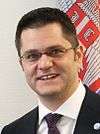 |
Vuk Jeremić | independent | Former Minister of Foreign Affairs (2007-2012) and former President of the United Nations General Assembly (2012-2013), his first presidential nomination. | Submitted 14,360 valid signatures to the electoral commission.[7] | ||
| Miroslav Parović | NSP | President of National Freedom Movement, his first presidential nomination. | Submitted 10.390 valid signatures to the electoral commission.[8] | |||
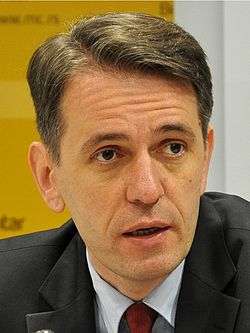 |
Saša Radulović | DJB | President of Enough is Enough political party, former Minister of Economy (2013-2014), his first presidential nomination. | Submitted 10,579 valid signatures to the electoral commission.[9] | ||
| Luka Maksimović | independent | The leader of a parody political party Sarmu probo nisi (SPN), his first presidential nomination. | Submitted 12,270 valid signatures to the electoral commission.[10] | |||
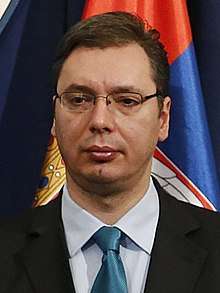 |
Aleksandar Vučić | SNS | Current Prime Minister of Serbia (2014-), former Minister of Information (1998-2000) and Minister of Defence (2012-2013), his first presidential nomination. | Submitted 56,516 valid signatures to the electoral commission.[11] | ||
 |
Boško Obradović | Dveri | President of Dveri political party, his first presidential nomination. | Submitted 11,212 valid signatures to the electoral commission.[12] | ||
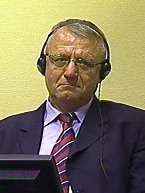 |
Vojislav Šešelj | SRS | Founder and president of Serbian Radical Party, his sixth presidential nomination. | Submitted 12,970 valid signatures to the electoral commission.[13] | ||
| Aleksandar Popović | DSS | Former Minister of Science and Environmental Protection (2004-2007) and Minister of Energy and Mining (2007-2008), his first presidential nomination. | Submitted 10,504 valid signatures to the electoral commission.[14] | |||
 |
Milan Stamatović | independent | President of Čajetina municipality since 2004, his first presidential nomination. | Submitted 12,027 valid signatures to the electoral commission.[8] | ||
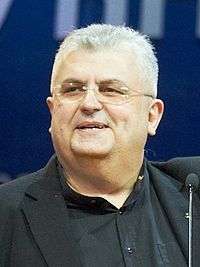 |
Nenad Čanak | LSV | President of League of Social Democrats of Vojvodina, his first presidential nomination. | Submitted 11,004 valid signatures to the electoral commission.[15] | ||
Campaigns which ended before the electoral window
On 15 February 2017, news outlets announced that Tomislav Nikolić had decided to run for president, despite not being nominated by the SNS.[16] However, five days later he publicly stated that he would not run for re-election.[17] Likewise, Dušan Janjić from Active Serbia had announced his candidacy in May 2016,[18] only to prematurely end his campaign on March 11, 2017.[19] On March 12, 2017, independent candidate Vladimir Rajčić announced that he terminated his presidential campaign, but that he will be active in future elections.[20] In March 2017 independent candidates Danijela Sremac, Saša Mirković and Andrej Fajgelj decided to end their campaigns.
Opinion polls
| Date | Polling Firm |  Vučić SNS* |
 Janković Ind. |
 Šešelj SRS |
 Jeremić Ind. |
 Obradović Dveri |
Maksimović Ind. |
Popović DSS |
 Stamatović Ind. |
Parović NSP |
 Čanak LSV |
 Radulović DJB |
Lead |
|---|---|---|---|---|---|---|---|---|---|---|---|---|---|
| 30 Mar | NSPM | 52.8 | 12.1 | 7.4 | 9.4 | 3.0 | 8.6 | 1.3 | 0.7 | 0.4 | 1.3 | 3.0 | 40.7 |
| 30 Mar | Ipsos | 54.3 | 12.8 | 6.5 | 6.8 | 3.2 | 9.5 | - | - | - | 1.1 | 1.8 | 41.5 |
| 29 Mar | Demostat | 56.2 | 8.9 | 8.8 | 9.3 | <3.0 | 9.5 | <3.0 | <3.0 | <3.0 | <3.0 | <3.0 | 46.7 |
| 25 Mar | Faktor Plus | 53.3 | 15.1 | 5.5 | 8.6 | 2.8 | 7.5 | <3.0 | 2.0 | <3.0 | <3.0 | <3.0 | 38.2 |
| 23 Mar | CeSID | 53.0 | 14.0 | 10.0 | 12.0 | - | 5.0 | - | - | - | - | - | 39.0 |
| 22 Mar | Ninamedia | 50.0 | 12.5 | 7.1 | 7.2 | <5.0 | 11.9 | <5.0 | <5.0 | <5.0 | <5.0 | <5.0 | 37.5 |
| 18 Mar | Ipsos | 53.0 | 10.6 | 8.7 | 6.9 | 3.5 | 11.0 | 1.1 | 1.5 | 0.3 | 1.7 | 1.7 | 42.0 |
| 17 Mar | Demostat | 57.0 | 11.0 | 8.0 | 9.0 | 3.0 | 3.0 | <3.0 | <3.0 | <3.0 | <3.0 | <3.0 | 46.0 |
| 16 Mar | NSPM | 54.9 | 10.8 | 7.0 | 11.1 | 3.3 | 7.9 | 0.9 | 0.7 | 0.4 | 1.0 | 2.1 | 43.8 |
| 7 Mar | Faktor Plus | 53.1 | 14.5 | 11.0 | 11.1 | 3.9 | - | - | 2.0 | - | <2.0 | 2.4 | 38.6 |
| 28 Feb | Ipsos | 52.3 | 13.9 | 11.0 | 13.3 | 3.7 | - | 0.8 | 0.8 | - | 1.7 | - | 38.4 |
| * Also nominating: SPS, SDPS, JS, PUPS, PS, SPO, PSS – BK, SVM |
Results
As Vučić received more than 50% of votes, no second round was held and he was elected.

| Candidate | Party | Votes | % |
|---|---|---|---|
| Aleksandar Vučić | Serbian Progressive Party | 2,012,788 | 55.06 |
| Saša Janković | Independent | 597,728 | 16.35 |
| Luka Maksimović | Independent | 344,498 | 9.42 |
| Vuk Jeremić | Independent | 206,676 | 5.65 |
| Vojislav Šešelj | Serbian Radical Party | 163,802 | 4.48 |
| Boško Obradović | Dveri | 83,523 | 2.28 |
| Saša Radulović | Enough is Enough | 51,651 | 1.41 |
| Milan Stamatović | Independent | 42,193 | 1.15 |
| Nenad Čanak | League of Social Democrats of Vojvodina | 41,070 | 1.12 |
| Aleksandar Popović | Democratic Party of Serbia | 38,167 | 1.04 |
| Miroslav Parović | National Freedom Movement | 11,540 | 0.32 |
| Invalid/blank votes | 61,729 | 1.69 | |
| Total | 3,655,365 | 100 | |
| Registered voters/turnout | 54.36 | ||
| Source: RIK | |||
Election controversies
The election was marred by accusations of voter intimidation and a near total domination of Serbia’s media by Vučić and his party.[21][22] Following the announcement of the results, protests were held across Serbia against Vučić's victory.[23] There were several issues. First, the electoral campaign was short only fulfilling minimal requirement of 30 days, despite the fact that these were regular elections. Also, until the last day it was unclear if there would be only parliamentary elections or parliamentary and City of Belgrade elections which hampered electoral strategies of opposition candidates. Furthermore, the governing majority made a decision to dissolve the parliament during the campaign, which was not justified and badly hurt visibility of opposition. Aleksandar Vučič who was Prime Minister and the candidate of the ruling coalition, campaigned while being in office which gave him big media coverage. Media bias in favour of Vučić and his coalition was significant, since Vučić had four times larger presence than the next-placed candidate. [22]
There were also a problems with imperfect electoral registers recorded which was similar as with previous elections. Controversy also arose regarding financing of electoral campaigns. Independent Investigative journalists reported that up to 6879 individual donors have provided Aleksandar Vučić's campaign with exactly 40.000 RSD each, which is near maximum amount and individual can contribute.[22]
On 3 April 2017, the Republican Electoral Commission announced that the election results from two polling stations in Bačka Palanka and Zrenjanin would be annulled and followed by a repeat vote at those stations on 11 April. This was due to reports of electoral fraud.[24] The following day, the election results were annulled in a further six municipalities, with re-runs also scheduled for 11 April.[25] The repeat vote in the eight municipalities could not change the outcome of the elections, as there were only 9,851 voters who are eligible to vote,[25] fewer than Vučić's margin of victory.
In Novi Pazar, where Vučić recorded 74.43% of the vote, Sead Biberović from the Novi Pazar-based NGO called "Urban-IN" claimed that there were "serious crimes committed at multiple polling stations," and that "some people went from station to station, where they threatened, used ransoms, and lied".[26] Rešad Hodžić, who was Saša Janković's campaign representative in Novi Pazar, claimed that "30,000 lists were prepared in the trunks of cars circulating between polling places, in an attempt to be cast into the voting boxes."[27] He said that the Janković campaign workers did as much as they could to stop electoral fraud, going on to say:
| “ | "In polling station #90, activists of the Party of Democratic Action of Sandžak gave poll workers 5,000 dinars each in order to submit 500 votes for Vučić, which they accepted. In the end, Vučić recorded 532 votes at that polling station. In Vranovina they offered 400 euros to submit 200 votes. For all of this we have witnesses and averments."[27] | ” |
On 3 April, following the announcement of Vučić's victory, a student protest formed in front of the Serbian National Assembly, which, according to Danas, was attended by over 10,000 people.[28] Protests after the election results were announced emerged in 15 cities throughout Serbia.[29]
References
- ↑ Serbia to hold presidential elections on April 2 B92, 28 February 2017
- ↑ B92, 27 March 2017
- ↑ Serbia IFES
- ↑ President-elect Vucic to remain PM for another two months B92, 3 April 2017
- ↑ Izborni listići: Janković 1, Jeremić 2, Beli 5, Vučić 6 B92, 17 March 2017
- ↑ "Девета седница Републичке изборне комисије". www.rik.parlament.gov.rs. 5 March 2017. Retrieved 5 March 2017.
- ↑ "RIK proglasila kandidaturu Vuka Jeremića". www.b92.net. 10 March 2017. Retrieved 10 March 2017.
- 1 2 "RIK proglasio kandidature Čanka, Stamatovića i Parovića, Beli nije na dnevnom redu".
- ↑ "16. sednica RIK-a".
- ↑ "Haos zbog Belog".
- ↑ "Девета седница Републичке изборне комисије". www.rik.parlament.gov.rs. 5 March 2017. Retrieved 5 March 2017.
- ↑ "RIK: Proglašena kandidatura Boška Obradovića".
- ↑ "RIK proglasio kandidaturu Vojislava Šešelja za predsednika". www.blic.rs. 6 March 2017. Retrieved 6 March 2017.
- ↑ "Proglašena kandidatura Aleksandra Popovića".
- ↑ "RIK: Potvrđeni Stamatović, Parović i Čanak, Beli nije još".
- ↑ "Nikolić odlučio da se kandiduje za predsednika". N1. 15 February 2017. Retrieved 16 February 2017.
- ↑ "OTKRIVAMO SVE DETALJE Nikolić se predao posle TIHIH SIGNALA IZ MOSKVE". Blic. 20 February 2017. Retrieved 20 February 2017.
- ↑ I Dušan Janjić najavljuje kandidaturu za predsednika Srbije Blic, 19 May 2016
- ↑ B92: Janjić odustao od predsedničke trke (in Serbian). March 11, 2017. Retrieved March 11, 2017.
- ↑ Blic: Rajčić odustao od kandidature za predsednika Srbije (in Serbian). March 12, 2017. Retrieved March 12, 2017.
- ↑ "A Serbian Election Erodes Democracy". The New York Times. 9 April 2017. Retrieved 9 April 2017.
- 1 2 3 Burazer, Nikola; Hackaj, Krisela; Shehaj, Ardita; Stefanovski, Ivan (2017). Democracy in Progress: shadow report on political Copenhagen criteria in Western Balkans EU candidate states. Belgrade: Centar savremene politike. ISBN 978-86-80576-04-6.
- ↑ Da Silva, Chantal (8 April 2017). "Serbian protesters accuse media of turning blind eye, as anti-corruption rallies continue". The Independent. Retrieved 9 April 2017.
- ↑ Tanjug (4 April 2017). "Mondo: Poništeni izbori: Sumnjiv JMBG i višak listića" (in Serbian). Retrieved 4 April 2017.
- 1 2 Tanjug (4 April 2017). "Večernje Novosti: Ponovljanje izbora na osam biračkih mesta 11. aprila" (in Serbian).
- ↑ A. Bajrović (3 April 2017). "Radio Sto Plus: Biberović: Rezultati ne pokazuju stvarno opredeljenje Novopazaraca" (in Serbian). Retrieved 4 April 2017.
- 1 2 N. Kočović (4 April 2017). "Radio Sto Plus: Hodžić: Totalna krađa, ni devedesetih nije bilo ovako" (in Serbian). Retrieved 4 April 2017.
- ↑ "Danas: Više od 10.000 mladih protestuje protiv diktature" (in Serbian). 3 April 2017. Retrieved 4 April 2017.
- ↑ "Danas: Protesti protiv vlasti u 15 gradova Srbije" (in Serbian). 4 April 2017. Retrieved 4 April 2017.
External links
